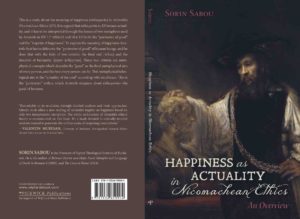Stimați frați colegi,
Împărtășesc cu voi o bucurie recentă. Ultimul meu proiect de cercetare a fost de curând publicat. Vă ofer mai jos miezul argumentului, coperta și link-ul de la editură. Soli Deo Gloria!
 This is a study about the meaning of happiness [εὐδαιμονία] in Aristotle’s Nicomachean Ethics (EN). This study argues that εὐδαιμονία in EN means actuality, and it has to be interpreted through the lenses of two metaphors used by Aristotle in EN 1.7 1098a21 and 10.6 1176a30: the ‘perimeter of good’ and the ‘imprint of happiness’. To explain the meaning of happiness [εὐδαιμονία] Aristotle, first has to delineate the ‘perimeter of good’ of man, and he does that with the help of two criteria: the final end [τέλος] and the function of man [ἔργον ἀνθρώπου]. These two criteria are metaphysical concepts which describe the ‘good’ as the final metaphysical aim of every person, and the best every person can be. This metaphysical teleological aim is the ‘actuality of the soul’ according with excellence. This is the ‘perimeter’ within which Aristotle inquires about the good of man [εὐδαιμονία].
This is a study about the meaning of happiness [εὐδαιμονία] in Aristotle’s Nicomachean Ethics (EN). This study argues that εὐδαιμονία in EN means actuality, and it has to be interpreted through the lenses of two metaphors used by Aristotle in EN 1.7 1098a21 and 10.6 1176a30: the ‘perimeter of good’ and the ‘imprint of happiness’. To explain the meaning of happiness [εὐδαιμονία] Aristotle, first has to delineate the ‘perimeter of good’ of man, and he does that with the help of two criteria: the final end [τέλος] and the function of man [ἔργον ἀνθρώπου]. These two criteria are metaphysical concepts which describe the ‘good’ as the final metaphysical aim of every person, and the best every person can be. This metaphysical teleological aim is the ‘actuality of the soul’ according with excellence. This is the ‘perimeter’ within which Aristotle inquires about the good of man [εὐδαιμονία].These two criteria of finality and function reach their completion in the activity of contemplation [θεώρια].This activity is the activity of the ‘highest part of us,’ the intellect, and this is the complete εὐδαιμονία. This is how εὐδαιμονία is ‘blown’ into every human life who achieves actuality, which is the actuality of the rational intellect. These metaphors of ‘perimeter’ and ‘imprint’ are political and educational metaphors. They describe what happens in the city, and how people achieve their ultimate goal, εὐδαιμονία, which is their actuality.